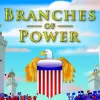Take a look inside 5 images
Branches of Power
Pros: Critical-thinking skills about process and cooperation help kids think like politicians, and they can visualize and sequence each part of the federal government.
Cons: Engagement with the executive and judicial branches is shallow compared to the legislative.
Bottom Line: Branches of Power shows how checks and balances work, although kids may learn the most about the legislative branch.
Use the game to add interactivity to a unit on government, showing (in an ideal world) how the three main branches work together. Students who struggle with reading large amounts of text will benefit from playing with others even though it's meant for single players. Otherwise, the social aspects of the game are reserved for kids with iCivics accounts who can save their games, avatar accessories, and Impact points, which they can use to vote for civic participation projects pursuing iCivics grants.
New players might find it difficult to between avatars or decide what to do first, but with the in-game help and some coaching, they should figure out they can win the game if they develop each issue in turn as their executive and legislative avatars.
Branches of Power, a free online game by iCivics, teaches kids about government as students shepherd issues through the executive, legislative, and judicial branches. Kids select avatars to represent leaders in each branch. These avatars travel a metaphorical political landscape as they try to develop issues from empty lots into golden towers that represent popular and constitutional laws.
Kids score points for successfully passing, signing, and reviewing laws. They win by developing each issue from an empty lot into a viable tower/law. The executive avatar can enter the tower to sign or veto the bill, and the judicial avatar can take a passed law from the tower to the Supreme Court for judicial review.
Full Disclosure: iCivics and Common Sense Education share a funder; however, that relationship does not impact Common Sense Education's editorial independence and this learning rating.
While exaggerated, the game shows how different actions can positively or negatively impact whether laws are passed. For instance, whether kids agree directly impacts the amount and type of support their issues receive. In the lawmaking "deliberation" portion, the provisions kids include in each law determine whether it will pass.
The legislative portions of the game work best. In town hall meetings, kids can actively agree or disagree with audience members' positions. By comparison, the executive and judicial portions of the game feel weak. In press conferences, the president answers Yes or No questions such as, "Does college usually only last one year?" Judicial review consists of picking the right or wrong reason to uphold or strike down a law. At the end of the game, kids can print score sheets showing their performance, as well as copies of the bills they passed.













